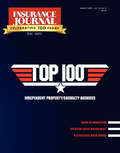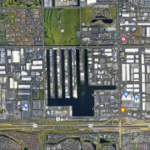Aon Corp. founder Patrick G. Ryan claims he was cheated out of hundreds of millions of dollars when Mu Sigma Inc. downplayed its own growth prospects in a ruse to buy back his investment company’s early stake in the fast-growing IT-services firm.
Mu Sigma and its founder were accused in a lawsuit of “grossly misleading” Ryan’s Walworth Investments LLC six years ago to redeem 17.5 percent ownership of the data-analytics outsourcing startup. By portraying Mu Sigma with dim prospects at a time when it was actually thriving, founder Dhiraj Rajaram schemed “to buy out a significant shareholder at an artificially low price,” according to the complaint made public Wednesday in Chicago state court.
Walworth says it ponied up $1.5 million in 2006 when Mu Sigma was new and desperate for capital and that the Ryan family agreed to accept $9.3 million from the IT firm to buy back the private shares in 2010. This deal was reached after Rajaram put “deceitful” pressure on Ryan’s son, Patrick Ryan Jr., telling him that Mu Sigma had limited growth potential because it was on the verge of losing its biggest clients, according to the complaint.
“We are aware of the filing and believe the allegations to be without merit,” Chicago-based Mu Sigma said in a statement. “We intend to vigorously defend the case, but decline to comment any further.”
Among the allegations is a claim that Rajaram’s zeal to become “a billionaire Indian-American entrepreneur” drove him to hoodwink one of his earliest backers. Walworth also alleges the motivation sprung partly from his religious beliefs.
‘Peverse Mindset’
“This perverse mindset — which turned traditional fiduciary duty principles on their head — had its roots in Rajaram’s devotion to the Hindu deity Shiva the Destroyer, whose core philosophy called for ‘destroying or selectively abandoning the past,”‘ Walworth alleged in court papers. “Only in hindsight did it become clear that Rajaram’s true objective was to gain back the ownership that he had been forced to share, and that, far from tapering off, Mu Sigma was growing geometrically.”
Mu Sigma firm won $133 million in funding from Sequoia Capital and General Atlantic LLC in 2011. Rajaram told Bloomberg News in April 2015 that annual revenue was at about $250 million and that he aimed to reach $1 billion in sales by 2022 while growing a six to seven percent rate every month. Rajaram owned 45 percent of Mu Sigma at that time.
The firm competes with outsourcing giants Cognizant Technology Solutions Corp., Tata Consultancy Services Ltd. and dozens of startups in helping customers get answers from the increasing quantities of data they collect. TCS, the world’s largest IT-services firm, earned about $15 billion in 2015 revenue, about 60 times Mu Sigma’s sales that year.
Mu Sigma employs more than 3,500 people globally and the Hurun Report in Luxembourg estimated in September that Rajaram’s wealth was growing at about 600 percent a year. In February, Rajaram was succeeded by his wife as chief executive officer of Mu Sigma. He remains chairman.
Chicago Bears
Walworth alleges that with the support a decade ago from Ryan, who is a part-owner of the Chicago Bears professional football team, Mu Sigma was able to line up other backers including Microsoft Corp., Wal-Mart Stores Inc. and Dell Inc.
In October 2010, months after telling Ryan’s son that Mu Sigma wouldn’t be the success he hoped for, a Chicago newspaper reported that Rajaram said he was nearing his goal of building “the world’s largest applied-mathematics company,” according to the complaint.
Walworth is asking a judge to order Mu Sigma to return the 7.76 million shares from the 2010 buyback or to pay damages equal to their relative value, including interest.
The case is Walworth Investments LG-LLC v. Mu Sigma Inc., 2016-L-002470, Circuit Court of Cook County, Illinois (Chicago).
Was this article valuable?
Here are more articles you may enjoy.


 Heritage Insurance Reports Third Straight Quarter of Profit After Shedding Policies
Heritage Insurance Reports Third Straight Quarter of Profit After Shedding Policies  Divers Find 32 Cars Submerged in Lake Near Miami
Divers Find 32 Cars Submerged in Lake Near Miami  Wall Street WhatsApp, Texting Fines Exceed $2.5 Billion
Wall Street WhatsApp, Texting Fines Exceed $2.5 Billion  Kellogg’s ‘Woke’ Workplace Diversity Programs Are Illegal, Group Claims
Kellogg’s ‘Woke’ Workplace Diversity Programs Are Illegal, Group Claims 

